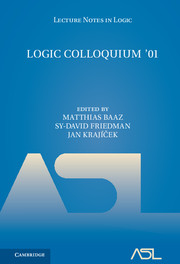Book contents
- Frontmatter
- Preface
- Contents
- TUTORIALS
- ARTICLES
- Modified bar recursion and classical dependent choice
- Choice and uniformity in weak applicative theories
- Compactness and incompactness phenomena in set theory
- Selection for Borel relations
- Interpolation in goal-directed proof systems 1
- Sequences of degrees associated with models of arithmetic
- The limit theory of generic polynomials
- Moschovakis's notion of meaning as applied to linguistics
- Tameness in expansions of the real field
- The model theory of compact complex spaces
- “Natural” representations and extensions of Gödel's second theorem 350
- Effective Hausdorff dimension
- Mutual stationarity in the coremodel
- The pair (Nn, N0) may fail N0-compactness
- Incompleteness theoremand its frontier
- Groups in Simple Theories
- References
Moschovakis's notion of meaning as applied to linguistics
from ARTICLES
Published online by Cambridge University Press: 31 March 2017
- Frontmatter
- Preface
- Contents
- TUTORIALS
- ARTICLES
- Modified bar recursion and classical dependent choice
- Choice and uniformity in weak applicative theories
- Compactness and incompactness phenomena in set theory
- Selection for Borel relations
- Interpolation in goal-directed proof systems 1
- Sequences of degrees associated with models of arithmetic
- The limit theory of generic polynomials
- Moschovakis's notion of meaning as applied to linguistics
- Tameness in expansions of the real field
- The model theory of compact complex spaces
- “Natural” representations and extensions of Gödel's second theorem 350
- Effective Hausdorff dimension
- Mutual stationarity in the coremodel
- The pair (Nn, N0) may fail N0-compactness
- Incompleteness theoremand its frontier
- Groups in Simple Theories
- References
Summary
Wenn man nicht weiß was man selber will,muß man zuerst wissen was die anderen wollen.
General Stumm von Bordwehr§1. Introduction: Moschovakis's approach to intensionality. G. Frege introduced two concepts which are central tomodern formal approaches to natural language semantics; i.e., the notion of reference (denotation, extension, Bedeutung) and sense (intension, Sinn) of proper names2. The sense of a proper name is wherin the mode of presentation (of the denotation) is contained. For Frege proper names include not only expressions such as Peter, Shakespeare but also definite descriptions like the point of intersection of line l1 and l2 and furthermore sentences which are names for truth values. Sentences denote the True or the False. The sense of a sentence is the proposition (Gedanke) the sentence expresses. In the tradition of possible world semantics the proposition a sentence expresses ismodelled via the set ofworlds in which the sentence is true. This strategy leads to well known problems with propositional attitudes and other intensional constructions in natural languages since it predicts for example that the sentences in (1) are equivalent.
(1) a. Jacob knows that the square root of four equals two.
b. Jacob knows that any group G is isomorphic to a transformation group.
Even an example as simple as (1) shows that the standard concept of proposition in possible world semantics is not a faithful reconstruction of Frege's notion sense.
Frege developed his notion of sense for two related but conceptually different reasons. We already introduced the first one by considering propositional attitudes. The problem here is how to develop a general concept which can handle the semantics of Frege's ungerade Rede. The second problem is how to distinguish a statement like a = a which is rather uninformative from the informative statement a = b or phrased differently how to account for the semantic difference between (2-a) and (2-b).
(2) a. Scott is Scott.
b. Scott is the author ofWaverly.
Frege's intuitive concept of sense therefore was meant both to model information and provide denotations for intensional constructions.
[12] develops a formal analysis of sense and denotation which is certainly closer to Frege's intentions than is possible world semantics. Moschovakis's motivations are (at least) twofold. The first motivation is to give a rigorous definition of the concept algorithm [13] and thereby provide the basics for a mathematical theory of algorithms.
- Type
- Chapter
- Information
- Logic Colloquium '01 , pp. 255 - 280Publisher: Cambridge University PressPrint publication year: 2005

